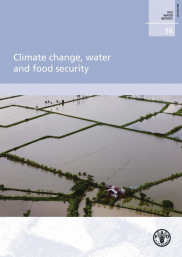
Climate Change, Water and Food Security

Executive Summary Excerpt
In assessing the anticipated impacts of climate change on agriculture and agricultural water management, it is clear that water availability (from rainfall, watercourses and aquifers) will be a critical factor. Substantial adaptation will be needed to ensure adequate supply and efficient utilization of what will, in many instances, be a declining resource. However, the long-term climatic risk to agricultural assets and agricultural production that can be linked to water cannot be known with any certainty. While temperature and pressure variables can be projected by global circulation models with a high degree of ‘convergence’, the same cannot be said of water vapour in the atmosphere. The levels of risk associated with rainfall and runoff events can only be determined with provisional levels of precision. These may not be sufficient to define specific approaches or levels of investment (e.g. the costs of raising the free-board on an hydraulic structure) in many locations.
This publication first summarizes the challenges facing agriculture and water without climate change. It then considers the broad and more specific impacts of climate change in different regions of the world, and looks at the options for adaptation and mitigation in some detail. It attempts to reach a practical focus without excessive generalization. The conclusion focuses on action needed to assist countries, in particular developing countries, in assessing probable climate change impacts on irrigated agriculture and on food production, and in adapting agricultural water management to cope with the range and depths of anticipated impacts.
- Issues:
- Climate Change, Natural Resources
- Region:
- Global
- Year Published:
- 2011
- Authors:
- Hugh Turral, Jacob Burke, Jean-Marc Faurès
- Institutions:
- Food and Agriculture Organization (FAO), United Nations

